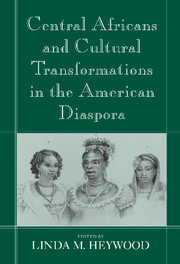Book contents
- Frontmatter
- Contents
- List of Contributors
- Foreword
- Acknowledgments
- Introduction
- PART ONE CENTRAL AFRICA: SOCIETY, CULTURE, AND THE SLAVE TRADE
- 1 Central Africa During the Era of the Slave Trade, c. 1490s–1850s
- 2 Religious and Ceremonial Life in the Kongo and Mbundu Areas, 1500–1700
- 3 Portuguese into African: The Eighteenth-Century Central African Background to Atlantic Creole Cultures
- PART TWO CENTRAL AFRICANS IN BRAZIL
- PART THREE CENTRAL AFRICANS IN HAITI AND SPANISH AMERICA
- PART FOUR CENTRAL AFRICANS IN NORTH AMERICA AND THE CARIBBEAN
- Index
3 - Portuguese into African: The Eighteenth-Century Central African Background to Atlantic Creole Cultures
Published online by Cambridge University Press: 28 October 2009
- Frontmatter
- Contents
- List of Contributors
- Foreword
- Acknowledgments
- Introduction
- PART ONE CENTRAL AFRICA: SOCIETY, CULTURE, AND THE SLAVE TRADE
- 1 Central Africa During the Era of the Slave Trade, c. 1490s–1850s
- 2 Religious and Ceremonial Life in the Kongo and Mbundu Areas, 1500–1700
- 3 Portuguese into African: The Eighteenth-Century Central African Background to Atlantic Creole Cultures
- PART TWO CENTRAL AFRICANS IN BRAZIL
- PART THREE CENTRAL AFRICANS IN HAITI AND SPANISH AMERICA
- PART FOUR CENTRAL AFRICANS IN NORTH AMERICA AND THE CARIBBEAN
- Index
Summary
INTRODUCTION
This essay argues that the process of religious interpenetration that John Thornton described in the previous chapter was visible in other aspects of central African culture as well, and that this dynamic continued to characterize Afro-Portuguese relations during the eighteenth century. It contends that by the beginning of the eighteenth century, a Creole culture had emerged in Portuguese Angola and Benguela and was undergoing significant transformation. It also argues that this phenomenon occurred as a result of the Africanization of Portuguese settlers and their culture, thus illustrating that creolization was not a process that only touched African culture and peoples. In Central Africa the Portuguese, a European people with a western culture, encountered no difficulties in adapting to a dominant African cultural environment. The essay also shows how Central Africans were adept at selectively integrating elements of European culture into their own cultural fabric.
THE CASE FOR ANGOLAN CREOLE CULTURE
Published works as well as the preceding contribution in this collection provide ample evidence to support the contention that Portuguese culture in Angola and Benguela had been significantly altered before the eighteenth century. What is less known are that the conditions that allowed this development to take place, and what accounted for its spread and continuous evolution far beyond the core coastal regions of Central Africa that the Portuguese inhabited.
Studies of Angola that have focused on this issue have highlighted the politico-military dimensions of the Portuguese-African relationship in the pre-nineteenth-century period, and they have applied the term “Luso-African feudalism” to characterize the vassalage arrangements that sealed the relationship between African rulers and the Portuguese in the region.
- Type
- Chapter
- Information
- Publisher: Cambridge University PressPrint publication year: 2001
- 2
- Cited by



